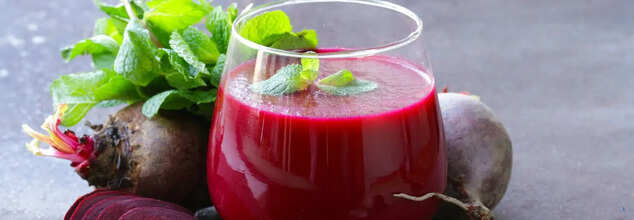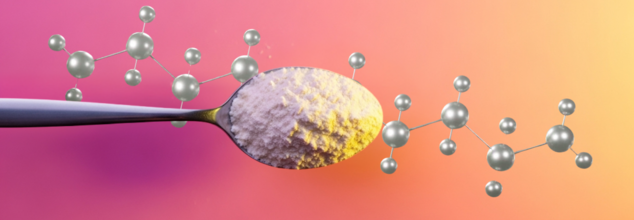- Health Conditions A-Z
- Health & Wellness
- Nutrition
- Fitness
- Health News
- Ayurveda
- Videos
- Medicine A-Z
- Parenting
- Web Stories
Why Should You Consume Beetroot Juice?

Credit: Canva
Beetroot juice is packed with essential nutrients and offers a range of health benefits. From improving blood pressure to enhancing athletic performance, this vibrant vegetable juice has gained popularity for its potential impact on overall well-being. However, while research supports many benefits, individual results may vary based on factors like dosage and existing health conditions.
Nutrient-Rich Profile
Beetroot juice provides a variety of vital vitamins and minerals that contribute to overall health. A single cup (248 grams) contains just 62 calories while it is packed with nutrients such as protein, carbohydrates, fibre, magnesium, potassium, zinc, vitamin C and much more.
Helps Lower Blood Pressure
Beetroot is naturally high in nitrates, which the body converts into nitric oxide. This compound relaxes and widens blood vessels, improving circulation and reducing blood pressure.
A 2019 study found that participants who consumed nitrate-rich beetroot juice experienced a 5.2 mm Hg greater reduction in blood pressure compared to those who had a placebo. A 2024 review further suggests that 200 to 800 mg of nitrate from beetroot juice daily may help lower systolic blood pressure in individuals with hypertension, although the evidence remains inconclusive.
Reduces Inflammation
Beetroot juice contains betalains, natural pigments with anti-inflammatory properties. Research indicates that beetroot juice may help regulate inflammation markers, even though its effects on conditions like long COVID remain unclear.
Additionally, a small 2024 study found that consuming a beet-based supplement for two weeks helped reduce inflammation linked to post-exercise recovery in athletes.
Supports Iron Levels and May Prevent Anemia
Beetroot contains iron, an essential component of red blood cells, which helps transport oxygen throughout the body. Low iron levels can lead to iron deficiency anemia, resulting in symptoms such as fatigue, dizziness, and shortness of breath.
A cup of beetroot juice provides 1.4 mg of iron, around 8% of the recommended daily value. While it can contribute to iron intake, individuals with anemia may require additional dietary sources or supplementation.
Promotes Liver Health
Research suggests that beetroot juice may help manage nonalcoholic fatty liver disease (NAFLD). A 2023 study found that individuals who drank beetroot juice—either alone or as part of a Mediterranean diet—experienced significant reductions in excess liver fat over 12 weeks. Combining beetroot juice with a Mediterranean diet appeared to enhance its effectiveness, though further studies are needed.
Enhances Athletic Performance
Beetroot juice is known for its potential to boost stamina and exercise efficiency due to its nitrate and betalain content. A 2018 study observed that trained cyclists who consumed 100 mg of beetroot concentrate daily for a week exhibited improved endurance and increased blood flow.
A 2024 mini-review also suggests that beetroot juice may be more effective than nitrate supplements in enhancing exercise performance, though more research is required.
Potential Cancer-Preventive Properties
Preliminary research indicates that beetroot juice may have anti-cancer effects, including:
- Inhibiting tumor cell growth
- Preventing new blood vessel formation in tumors
- Promoting the breakdown and recycling of old cells (autophagy)
May Improve Cognitive Function
Some research suggests that beetroot juice could support brain function. A 2021 study on taekwondo athletes found that those who consumed 400 mg of nitrate-rich beetroot juice demonstrated better cognitive performance than those who received a placebo or a higher nitrate dose.
Suggested Beetroot Juice Intake
There is no official recommendation for beetroot juice consumption. However, a 2024 review suggests that consuming between 200 and 800 ml per day may be effective for reducing blood pressure.
Intermittent Energy Restriction: How Just Two Days Of Calorie Cuts A Week Can Transform Diabetes Management?

Credits: Health and me
Living with type 2 diabetes often means navigating a maze of diet advice, lifestyle shifts, and blood sugar checks. For those also dealing with obesity, the pressure to find an effective, sustainable eating plan can feel relentless. But what if the solution doesn’t require daily restrictions or extreme fasting windows?
A growing body of research is pointing to intermittent energy restriction (IER)—a strategy that involves eating normally most days and cutting calories just two days a week—as a smarter, more flexible option. Unlike traditional diets that demand constant vigilance, IER appears to offer powerful metabolic benefits with less burnout. In a new clinical trial, it even outperformed other popular methods like time-restricted eating and continuous calorie restriction in improving blood sugar levels, insulin sensitivity, and adherence.
Managing type 2 diabetes and obesity is often a juggling act—between diet, medication, and daily discipline. But what if the answer wasn’t eating less every day, but just twice a week? A growing body of research is pointing to intermittent energy restriction (IER) as a sustainable and effective dietary strategy. And new findings presented at the Endocrine Society’s 2025 meeting are adding weight to the argument.
What Is Intermittent Energy Restriction?
IER is a structured eating pattern where individuals dramatically reduce their calorie intake on just two non-consecutive days per week, while eating normally the rest of the time. It’s not fasting. You still eat—just much less. And unlike time-restricted eating (TRE), you’re not limited by hours in the day.
The most common format is 5:2 IER—five days of normal eating and two days of around 500–600 calories. On non-restricted days, the goal is to eat balanced meals without bingeing. In a randomized 16-week trial, 90 obese adults with type 2 diabetes were split into three groups:
- IER (5:2 calorie restriction)
- Time-Restricted Eating (10-hour eating window daily)
- Continuous Energy Restriction (consistent daily calorie cuts)
All participants consumed the same weekly calories. But the IER group saw the best results across multiple markers:
- Significant reduction in HbA1c (a long-term blood sugar marker)
- Lower fasting glucose and triglycerides
- Improved insulin sensitivity via the Matsuda index
- Highest adherence rate among all groups
Out of 90 participants, 63 completed the trial, with an average age of 36.8 and a BMI of 31.7 kg/m². Most had lived with diabetes for less than two years. People with diabetes and obesity often struggle with long-term adherence to rigid diets. The flexibility of IER may be the game-changer. You’re not depriving yourself daily—and yet, you’re seeing meaningful metabolic changes.
According to Dr. Haohao Zhang, the study’s lead investigator from Zhengzhou University, “These results provide scientific guidance for clinicians to choose effective and sustainable diet plans for patients with obesity and type 2 diabetes.”
Intermittent Energy Restriction vs Intermittent Fasting: Which is Better?
IER is different from traditional intermittent fasting (like the 16:8 or alternate-day fasting) in one crucial way: it doesn’t involve complete fasting. Instead, it focuses on structured calorie reduction, which makes it more accessible for people with diabetes who need blood sugar stability.
Another meta-analysis of 99 clinical trials found that while alternate-day fasting showed modest weight benefits, IER had the best adherence and metabolic improvements in real-world settings.
How to Start Intermittent Energy Restriction?
If you’re managing diabetes or obesity (or both), and you’re curious about IER, here’s how to start:
- Choose two non-consecutive days per week to restrict calories to ~500–600 kcal.
- On those days, focus on high-fiber, low-carb, and protein-rich meals.
- Avoid sugary drinks, refined carbs, and high-fat processed foods.
- Track blood sugar levels regularly, especially in the beginning.
- Talk to your doctor or dietitian—especially if you're on insulin or medications.
Example meal on an IER day:
Breakfast: Boiled eggs with sautéed spinach
Lunch: Grilled chicken breast with steamed broccoli
Snack: A handful of almonds or Greek yogurt
IER is not just effective—it’s also realistic. In the study, adherence was 85% in the IER group, compared to 78% in the TRE group. That matters in the real world, where life, social obligations, and work can derail rigid food plans.
And with no major safety concerns (only mild hypoglycemia reported in a few cases), it’s emerging as a low-risk, high-reward strategy.
While these short-term results are promising, researchers stress the need for longer-duration trials (beyond 6 months). They also want to explore how IER performs in older adults, different ethnic groups, and patients with long-standing diabetes.
But for now, experts say IER could be added to the diabetes care toolkit—not as a replacement for traditional plans, but as a more flexible, effective alternative for those who struggle with daily restrictions.
Could Less Really Be More?
We’re in an era where managing chronic conditions like diabetes demands both science and sustainability. And intermittent energy restriction checks both boxes. It allows freedom five days a week, and structured discipline on two—and that’s a balance many patients are looking for. If you’ve tried daily dieting and burned out, this might be the shift your body—and mind—need.
It’s In Cheese, Soy And Semen! This Natural Compound Can Help People Live Longer

Credits: Health and me (representational)
We have been conditioned to believe longevity is a matter of eating better, sleeping more, and getting our steps in. While that still holds true, researchers and biohackers are increasingly turning their attention to lesser-known compounds that might actually influence how long and how well we live.
The answer is spermidine. Yes, the name sounds awkward, and yes, it was first isolated from semen but if you can get past the origin story, the science behind it is turning heads in longevity research circles. From Japanese medical traditions dating back over a millennium to cutting-edge anti-aging routines in Silicon Valley, spermidine is being taken seriously and for good reason.
What Is Spermidine?
Spermidine is a naturally occurring polyamine, a compound found in nearly every cell in your body. It plays a critical role in cell growth, repair, and renewal. Over time, as we age, the body’s natural production of spermidine declines, leading scientists to explore ways to replenish it through food, supplements, or gut microbiota enhancement.
And yes, while semen was the first biological source it was isolated from (hence the name), spermidine is found in many places: mushrooms, broccoli, aged cheese, breast milk, and even fermented soybeans.
Connection Between Longevity and Sexual Energy
Centuries before spermidine had a name, Eastern traditions were tapping into its potential. In the 28th scroll of Ishinhō — one of Japan’s oldest medical texts — there are specific longevity practices linked to preserving jingqi (life force), emphasizing sexual energy and non-ejaculatory arousal for men. While the text didn’t mention spermidine, the biological rationale seems to track. Now, scientists believe that higher levels of this compound in semen and breast milk may play a part in growth, repair, and immune regulation.
What Can Spermidine Actually Do?
While human trials are still in early stages, preclinical and observational research has shown potential in a number of areas:
Anti-Aging at the Cellular Level
One of the most exciting findings is spermidine’s role in autophagy, a process where cells clean out damaged components to regenerate newer, healthier ones. This mechanism is vital for slowing aging and preventing chronic diseases. Animal studies have shown that spermidine supplementation extended lifespan in mice, yeast, and even worms.
For humans, the jury is still out, but that hasn’t stopped biohackers and longevity enthusiasts — like tech entrepreneur Bryan Johnson — from incorporating spermidine into their daily anti-aging regimens alongside plasma therapy and micronutrient stacks.
Heart Health and Longevity
A 2018 study found that spermidine could improve heart function in mice and extend their lifespan. Even more compelling: a population study involving more than 2,500 participants found that higher spermidine intake was associated with reduced cardiovascular mortality.
These heart benefits are believed to stem from spermidine’s ability to reduce inflammation and improve mitochondrial function — both critical for aging hearts.
Fertility and Reproduction
Although the connection between spermidine and reproduction isn’t surprising given its original source, it’s now being studied more seriously. One trial found that middle-aged mice given high doses of spermidine had improved fertility outcomes — faster egg maturation and larger litters.
There’s growing speculation that spermidine might enhance reproductive longevity in humans, particularly for women looking to extend fertility windows.
Brain Function and Cognitive Health
Cognitive decline is one of aging’s most distressing effects. A 2020 study found that spermidine consumption protected rodents from age-related brain deterioration, including memory lapses and motor impairment.
Scientists are hopeful that these findings can eventually translate into dietary interventions or supplements that may help stave off neurodegenerative conditions like Alzheimer’s or Parkinson’s in humans.
Immunity and Inflammation
Chronic inflammation is a common denominator across many diseases. Because spermidine encourages autophagy and cellular cleanup, researchers believe it could support immune function and help the body respond better to infections or injury — particularly as we age.
Why the Gut Microbiome is Important For Long Life?
Interestingly, your body doesn’t just get spermidine from food. It’s also produced by the gut microbiota, the community of bacteria and microorganisms living in your digestive tract but as we age, the microbiome shifts, and production of key polyamines like spermidine declines.
That’s why some supplements (like Primeadine) combine spermidine with prebiotics to stimulate the body's natural production and absorption. It's a multi-pronged approach — one that respects the interplay between food, microbes, and molecular health.
Where You Can Get Spermidine Naturally?
You don’t have to pop a pill to boost your spermidine levels. It’s found in:
- Soybeans and fermented soy products (especially natto, a traditional Japanese dish)
- Aged cheese
- Mushrooms (like shiitake)
- Spinach and broccoli
- Cauliflower and fresh green pepper
- Amaranth grain
- Pumpkin and grapefruit
Of all these, natto contains the highest spermidine levels — though it’s not the most accessible or palatable option for everyone. For those who prefer to avoid its gooey texture and intense smell, spermidine supplements derived from wheat germ or fermented soy may be a better bet.
Is It Safe?
Here’s the reassuring part: Clinical trials so far show that spermidine supplements are generally safe, with no known side effects. Because it’s a compound your body already produces, it’s well-tolerated. However, long-term effects in humans haven’t been fully studied yet, so moderation and medical consultation are still wise.
The idea that a compound first discovered in semen could help people live longer might sound like something out of a biohacking satire — but the science behind spermidine is growing rapidly. From cellular recycling to heart health and fertility, it shows real promise as a multifunctional longevity aid.
Still, this isn’t a miracle fix. No supplement can replace the fundamentals: movement, real food, sleep, connection. But as we learn more about how our cells age and how we might intervene, spermidine could well become part of the broader toolbox for healthier, longer living.
Whether you're experimenting with fermented soy or considering supplements, the goal remains the same — to live longer, better, and with more vitality. And if a little-known polyamine can help get us there, awkward name or not, it’s worth paying attention to.
This Daily Seasoning Is Twice As Dangerous To Your Heart And Kidney For Indians, Flags ICMR Study

Credits: Canva
Salt is essential but in the quantities it’s being consumed across India, it’s also becoming lethal. Scientists from the Indian Council of Medical Research’s National Institute of Epidemiology (ICMR-NIE) are sounding the alarm: excessive salt intake is quietly fuelling a rise in hypertension, stroke, kidney damage, and cardiovascular disease.
The numbers speak for themselves. The World Health Organization (WHO) recommends less than 5 grams of salt per person per day. Urban Indians are consuming nearly double that—around 9.2 grams daily. Even in rural communities, where processed food intake is relatively lower, the average is about 5.6 grams/day. This isn’t just a matter of preference; it’s a looming public health crisis.
To tackle this issue, ICMR-NIE has launched a three-year community-based salt reduction project in Punjab and Telangana. The goal is simple but ambitious: bring salt consumption closer to the WHO threshold by working directly with local communities. What sets this apart is the model—they’re not pushing health education top-down. Instead, they’re co-creating solutions with health workers, residents, and local authorities.
Dr Sharan Murali, senior scientist and principal investigator of the study, says this approach is intentional. “We’re not just distributing pamphlets. We’re listening first. Health interventions work best when they’re built with the people who will use them.”
This model of collaborative design is being trialled through India’s network of Health and Wellness Centres (HWCs), where trained health workers will deliver personalised salt-reduction counselling. The focus is particularly sharp on people already living with hypertension.
Why the Focus on Salt?
There’s a reason salt is getting so much attention from epidemiologists and public health experts. It’s directly linked to raised blood pressure—one of the strongest risk factors for heart attacks, strokes, and kidney failure.
Dr Murali explains that even modest reductions in sodium intake can lead to noticeable health improvements. “Just switching to low-sodium salt can lower blood pressure by an average of 7/4 mmHg. That’s a small change with big potential, especially when scaled across millions of people.”
These low-sodium salts, often made by replacing part of the sodium chloride with potassium or magnesium salts, are already available in some markets. But the real problem? Access and affordability.
Can Low-Sodium Salt Help?
Before launching the intervention, researchers from NIE conducted a market survey across 300 retail stores in Chennai to assess the availability and pricing of low-sodium salt substitutes (LSS). The findings were discouraging. While 52 percent of supermarkets stocked LSS, just 4 percent of small grocery shops carried them. On average, LSS was more than twice the cost of standard iodised salt—Rs 5.6 per 100g compared to Rs 2.7 per 100g.
“The supply-demand mismatch is glaring,” says Dr Murali. “Low availability is often a proxy for low awareness. People don’t ask for what they don’t know exists. That’s where public education plays a critical role.”
To amplify the conversation, ICMR-NIE launched a digital campaign called #PinchForAChange on social media. The campaign uses bite-sized messages, infographics, and quick facts to raise awareness around the hidden salt in common Indian foods, advocate for healthier choices, and make low-sodium salt feel like a tangible option—not a medical compromise.
Dr Ganesh Kumar, a senior scientist at NIE and part of the intervention team, says the goal is to normalize lower salt use without inducing fear. “This isn’t about villainizing Indian cuisine. It’s about finding ways to retain the flavor while dialing down the danger.”
The NIE’s program is more than just a research trial—it’s a blueprint for future policy. If the intervention works, it could integrate a salt-reduction module into India’s national health framework, particularly in chronic disease programs. It could also trigger price regulations, improve retail distribution, and increase demand for heart-healthy salt alternatives.
“It’s time to stop treating salt as an invisible ingredient,” Dr Murali says. “This study is about making the invisible, visible—on labels, in stores, and in conversations around health.”
The intervention’s first year is focused on groundwork—baseline surveys, stakeholder mapping, and training community health workers. The second and third years will roll out the intervention in phases, with rigorous data collection to track shifts in sodium intake and blood pressure levels.
Though this is an India-specific project, its implications are global. The problem of excess sodium isn’t limited to India. Across the globe, people are unknowingly consuming dangerous amounts of salt, mostly hidden in processed food, sauces, snacks, and bread. What ICMR-NIE is attempting—pairing science with community-led implementation—could serve as a model for other developing nations grappling with similar public health challenges.
The WHO has identified salt reduction as one of the five priority actions to reduce noncommunicable diseases. Yet progress has been patchy. What sets this project apart is its bottom-up model—one that could potentially offer more sustainable, community-supported outcomes.
One Pinch at a Time
In a country where food is deeply cultural, where flavors are layered and bold, telling people to “eat less salt” isn’t enough. But offering affordable, accessible alternatives? Partnering with communities? Making salt reduction a collective effort, not just an individual choice?
That might just work. As Dr Murali puts it, “This is not just about salt. It’s about balance—on our plates, in our bodies, and in public health. Change doesn’t need to be overwhelming. Sometimes, it begins with just a pinch.”
© 2024 Bennett, Coleman & Company Limited

